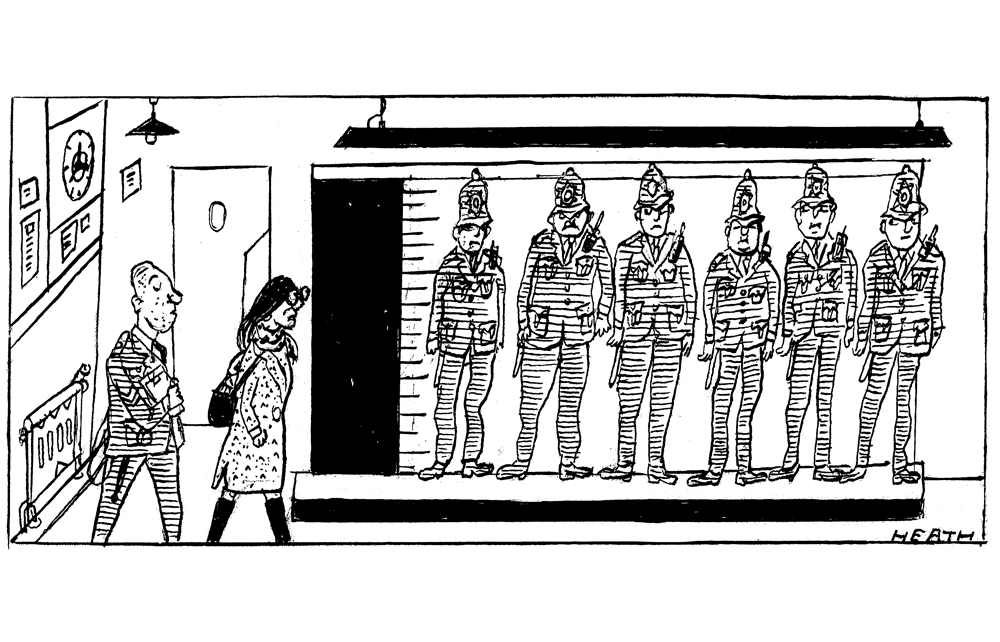Picture the scene: the press conference room at New Scotland Yard in March 2023 – just after the publication of a damning report into the Metropolitan Police by Baroness Casey of Blackstock. Casey’s review, announced following the kidnap, rape and murder of Sarah Everard by a serving Met officer, had concluded that ‘predatory behaviour’ was ‘allowed to flourish’ in the Met, with ‘too many places for people to hide’, leaving the integrity of the organisation ‘vulnerable to threat’.
The Met were on the defensive – but they had a clear plan to raise standards and restore trust and they wanted journalists to hear it. The leadership team spoke with determination and purpose about the measures they were taking to rid the force of officers whose behaviour had raised concerns. But there was a huge problem.
To our astonishment, the Met revealed that a police officer who failed vetting checks could not be automatically sacked. It was a massive gap in police regulations that had never been filled. The force said they intended to work around it by introducing a novel, and untested, process, known as Operation Assure. Officers whose vetting clearance was withdrawn would be referred to a ‘gross incompetence’ hearing where, in the vast majority of cases, the outcome would inevitably be dismissal.
Scotland Yard knew that at some point one of their officers would challenge the legality of this process in the courts and so it has proved. Lino Di Maria, a sergeant in a forensics services unit, brought the case, with the backing of the Metropolitan Police Federation, after the Met withdrew his vetting clearance and ordered him to face a ‘gross incompetence hearing’.
Di Maria has been the subject of a series of complaints during his 21-year police career, including allegations of rape. He has denied wrongdoing and none of the complaints or allegations has led to criminal charges or a misconduct hearing. But in 2023, Di Maria’s case was examined under Operation Assure. It was found that the allegations showed a ‘clear pattern of unprofessional behaviour and conduct which fell below expected standards and which… on the balance of probability would be repeated… The significant adverse complaints and conduct history indicated an abuse of position and indicated that he was coercive and intimidating.’
Mrs Justice Lang, however, who heard the case in the High Court, was far from convinced that it met the test for dismissal and ruled against the Met on four key legal grounds. She said the force had acted unlawfully, because vetting clearance was not a ‘legal pre-requisite’ to be a police officer, adding that the Met had exceeded their powers and treated the police sergeant unfairly. It means Di Maria, and 129 other Met officers and staff whose vetting is currently under scrutiny as part of Operation Assure, will be staying with the force – at least for the foreseeable future. It’s even possible that some of the 96 officers who left during the vetting review process could seek to be reinstated.
Yet it’s hard to pin the blame on Scotland Yard for this fiasco, or, as the judge described it, the ‘anomalous situation’ where officers without vetting clearance cannot be dismissed. Sir Mark Rowley, the Met Commissioner, and his colleagues had tried to find an innovative way around a set of rules that defied common-sense. They had little option but to push the boundaries of the law.
No, the real fault lies with the failure of successive governments to fix the broken police vetting system. There has been warning after warning, but nothing meaningful from Ministers except drift and delay. In 2012, the policing watchdog, then known as the Independent Police Complaints Commission, suggested sweeping changes to vetting procedures to reduce the risk of abuse by officers. Seven years later, it emerged in a policing inspection report that 35,000 officers, staff and contractors had not been properly vetted. Then came the Casey review which sounded the loudest alarm of them all.
‘Recruitment and vetting systems are poor and fail to guard against those who seek power in order to abuse it,’ Casey argued. ‘Vetting standards should be changed with immediate effect to guard against those who intend to abuse the powers of a police officer.’
‘Immediate effect’ – but that was almost two years ago. Since then there has been yet another report, by Lady Elish Angiolini, which also called for police vetting reforms. Despite all that, as Mrs Justice Lang pointed out, there has been no change to the police regulations to ensure that a vetting failure results in dismissal. In May 2024, James Cleverly, who was then the Home Secretary, conducted a consultation on draft regulations designed to place vetting on a statutory footing, but the general election was called, which stalled the process and ushered in a new government. Indeed, it was only on the first day of the court hearing, four weeks ago, that the new Home Secretary, Yvette Cooper, an interested party in the proceedings, issued a revised set of draft regulations.
That last-minute intervention was too late for this case, but it is not too late for policing. The Home Office must immediately bring forward a robust set of police regulations that fixes the loophole which Rowley has correctly described as ‘absurd’. What is even more scandalous is that ministers have known about this issue and the wider shortcomings of police vetting rules for years but failed to act. It’s time to put that right.







Comments